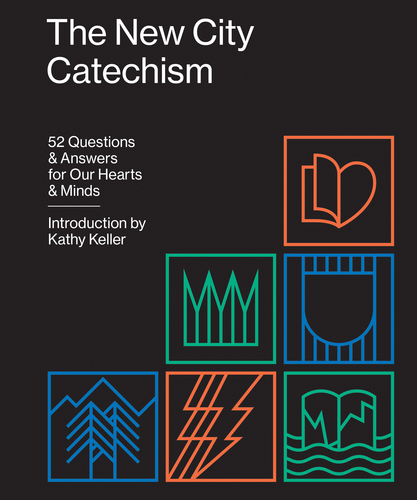Now available: The New City Catechism Curriculum, 52 lessons designed to help children ages 8–11 learn the core doctrines of the Christian faith in a Sunday school, classroom, or homeschool setting. Order yours today!
We used a version called Catechism for Young Children, a highly simplified version based on the Westminster Shorter Catechism. The first questions are quite easy, and the answers so short that even an 18-month-old can answer triumphantly “God!” when asked “Who made you?” and “Everything” to the second question, “What else did God make?” We discovered our kids loved the question/answer dynamic; to them it was almost a game, through which they could experience a legitimate sense of achievement.
My first encounter with teaching a catechism to children was even more counterintuitive. As a seminary student I spent one summer working for a church in a gang-infested part of Philadelphia. There I heard of a young pastor in an even more troubled area of the city who had developed a very successful ministry to children. It met on Saturdays and attracted hundreds of elementary and middle school kids. I decided to go see the program in action.
I’m not sure what I expected—warmhearted volunteers dispensing Kool-Aid, hugs, and Jesus stories—but what I found, to my slack-jawed amazement, was a building with more than 200 kids in it, divided by age group, learning the catechism! I must admit that few things have surprised me more. I had never given a thought to the catechism as a modern-day teaching tool, and even if I had, it wouldn’t have occurred to me to use it in these circumstances. The pastor was used to the shocked disbelief and surprised questions—“Why on earth are you having them memorize a catechism? Don’t they need the basic gospel message? When do you get to that?” I still haven’t forgotten his answer:
These kids know nothing whatsoever about God, or Jesus, or sin. They’ve never even heard the words, except as curse words. We’re building a framework in their minds of words and ideas and concepts, so that when we do tell them about sin and the Savior who came to die for it, there is a way for them to understand what we are saying.
I went away chastened, but not entirely convinced. Maybe so, but it still seemed so, so medieval to have children memorizing the catechism, no matter how deprived their spiritual education had been.
A few weeks later I changed my mind.
I had developed a mentor relationship with a 12-year-old girl from the neighborhood, and I was sharing the gospel with her, or so I thought. Waxing eloquent, I said, “Do you know what Easter means?” She thought seriously for a moment, and then answered, “It was either when that guy was born or when he died, I forget.” I realized she had no framework to understand my words. I wish I’d started her on a catechism instead.
One last personal story from my family. Jonathan, our youngest, was waiting for me to pick him up at his babysitter’s house. As he stared pensively out the window, she asked him: “What are you thinking about?” Unbeknownst to her, this triggered the adult-asks-a-question-and-I-provide-an-answer part of his brain, so his answer was (taken from the pages of the catechism) “God.” “What are you thinking about God?” she responded in surprise, and got the even more surprising answer (comprising the second and third catechism answers): “How he made all things for his own glory.” She almost fell over—she thought she was in the presence of a prodigy. Really, it was just the catechism.
Time and Commitment
Stories aside, how do people in the real world, with real 21st-century families, find the time or commitment to do something like a catechism? It’s a challenge. Most families, on their own, stop and restart several times. (We did, too.) It is so much easier if there is a church-sponsored program, or small group accountability, where each week the next question and answer will be memorized for recitation. One mother at our church wrote:
We have several ways that catechesis has fit into our family lives . . . some more successful than others, but we do feel it is very important. We’ve used a catechism for bedtime devotionals with our children. We have started and stopped memorizing catechisms as a family several times. And I taught it as a class at church for 4th/5th graders. The positive effect catechesis has had on our family is: summarizing God’s truths into digestible question and answers so that, as our children experience life and the world around them, they are able to understand how God has worked through time and history, how he will work in their lives, and how he will work in the future. As we walk through the difficult questions in life, the catechism is often the guide to which we are able to direct our children to scriptural truths.
The key is becoming convinced that you are furnishing your child with the mental foundation on which the rest of his or her spiritual life will be built. Or, to switch metaphors, you are laying the kindling and the logs in the fireplace, so that when the spark of the Holy Spirit ignites your child’s heart, there will be a steady, mature blaze.
Related:
Free eBook by Tim Keller: ‘The Freedom of Self-Forgetfulness’
 Imagine a life where you don’t feel inadequate, easily offended, desperate to prove yourself, or endlessly preoccupied with how you look to others. Imagine relishing, not resenting, the success of others. Living this way isn’t far-fetched. It’s actually guaranteed to believers, as they learn to receive God’s approval, rather than striving to earn it.
Imagine a life where you don’t feel inadequate, easily offended, desperate to prove yourself, or endlessly preoccupied with how you look to others. Imagine relishing, not resenting, the success of others. Living this way isn’t far-fetched. It’s actually guaranteed to believers, as they learn to receive God’s approval, rather than striving to earn it.
In Tim Keller’s short ebook, The Freedom of Self-Forgetfulness: The Path To True Christian Joy, he explains how to overcome the toxic tendencies of our age一not by diluting biblical truth or denying our differences一but by rooting our identity in Christ.
TGC is offering this Keller resource for free, so you can discover the “blessed rest” that only self-forgetfulness brings.



































